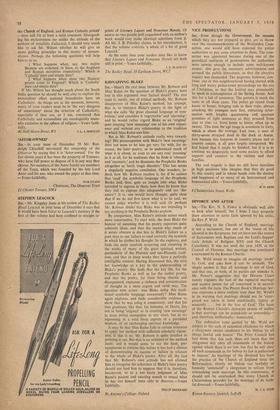DIVORCE AND AFTER • SIR,—The Rev. N. S. Power is
obviously well able to look after himself, but I hope I may properly draw attention to some facts ignored by his critic, the Rev. P. Wyld.
According to the Church of England, marriage is not a sacrament, but one of the `states of life allowed in the Scriptures; but yet have not like nature of Sacraments with Baptism and the Lord's Supper' (vide Article of Religion XXV and the Church Catechism). It was not until the year 1439, at the Council of Florence, that marriage was constituted a sacrament by the Roman Church.
Mr. Wyld seems to imagine all marriage 'made' by God, and asks how it can be unmade. The simple answer is that all marriage is not of God, and that one, or both, of its parties can unmake it. Mr. Power's suggestion that the Divorce Court merely registers the fact of the ruptured marriage and secures justice for all concerned is in accord- ance with the facts. The Prayer Book's Marriage Ser- vice expresses a more realistic view than Mr. Wyld's in its warning that marriage should not be 'enter- prised nor taken in hand unadvisedly, lightly or wantonly . . . but in the fear of God.' The basis of the Roman Church's elaborate system of nullity is that marriage can be mistakenly or unworthily— and, therefore, ineffectually—contracted.
The ordination vows quoted by Mr. Wyld are subject to the oath of canonical obedience by which a clergyman swears obedience to his bishop 'in all things lawful and honest.' The Privy Council has laid down that this oath 'does not mean that the clergyman will obey all commands of the bishop against which there is no law, but that he will obey all such commands as the bishop by law is authorised to impose,' As marriage of the divorced has been the practice of the Church of England since the Reformation, clearly no bishop can lawfully or honestly 'command' a clergyman to refrain from solemnising such marriage. In this controversy, it should not be overlooked that every Church in Christendom provides for the marriage of its faith- ful divorced.—Yours faithfully, Kirton Rectory, IpsiVich, Suffolk
W. J. S. WEIR










































 Previous page
Previous page